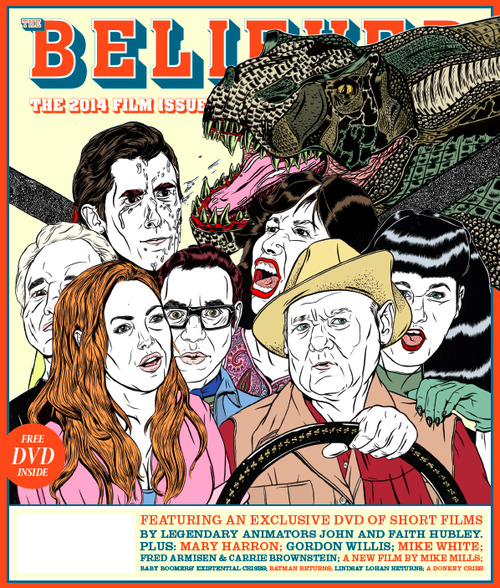
The following is an excerpt from this month’s film issue, an interview with Mike Mills about his film A Mind Forever Voyaging Through Strange Seas of Thought Alone. Read the full piece on Believermag.com and get access to the film from this month’s issue of the magazine.
Mike Mills interviewed by Gideon Lewis-Kraus
The children of Silicon Valley tech workers—the preadolescent offspring of Apple engineers and Cisco consultants, restaurant cooks at Google and PR managers at tiny start-ups—sit dressed in dark jeans and freshly washed hoodies, describing the world as it will look and feel seventy or eighty years in the future. The questions that prompt these predictions come from behind the camera in the bemused, encouraging voice of the filmmaker Mike Mills. Mills asks the kids about their relationship to technology and how it will shape the world they’ll inherit: will there be more or fewer poor people in the future? Will people be smarter? How will nature change?
The children’s answers are charming—as any speculative conversation with a curated group of eight- to eleven-year-olds is bound to be—but as they raise questions about the environmental, economic, and social legacy of Silicon Valley’s comprehensive influence on their lives, their predictions take a darker turn. The film, A Mind Forever Voyaging Through Strange Seas of Thought Alone, was commissioned by the San Francisco Museum of Modern Art and appeared as part of a temporary installation Mills created in a vintage costume shop in Los Altos, California, where he also produced a broadsheet reprint of a 1976 issue of the Los Altos Town Crier combined with “official documentation of the formation of the Apple Computer Company.” That exhibition closed in March, but the film is now available to Believer readers through May 1, 2014 atbelievermag.com/mikemills
Mills, whose feature-film credits include Thumbsucker and the Oscar-winning Beginners, started his career making experimental documentary shorts like Deformer and Paperboys(about skateboarder and artist Ed Templeton and a group of Minnesota paperboys, respectively). As Jennifer Dunlop Fletcher, the SFMOMA project’s curator, points out, A Mind Forever Voyaging is a part of this lineage of portrait films, and like those two early shorts it offers “an empathetic view of suburban America” in its current iteration.
This conversation between Mills and Gideon Lewis-Kraus occurred during his recent visit to San Francisco for a screening of the film.
—The Editors
THE BELIEVER: What one immediately notices in the film is that this is a pretty ethnically diverse group, but it seems, given that one knows this is taking place in Los Altos, that they’re pretty socioeconomically homogenous. I counted just two working-class jobs among the parents, and I’m curious how you made those decisions about casting and what kind of group of kids you wanted to come up with.
MIKE MILLS: Our rule was that the parents had to work in Silicon Valley. And most of them lived around Los Altos, but there were a few from San Francisco or Oakland, but the parents worked in [Silicon Valley]. And the idea was to get the spectrum of laborers there. There were a few parents who worked in sales, but as day laborers they didn’t have full contracts. But it was really hard to get people who worked in janitorial services, or gardeners. We were actually lucky to get one kid whose dad was a cook at Google.
You talk to the human-resources element of those companies and they just do not want to connect you with that arm of their company. We tried to independently get hold of a gardening service, and they didn’t want to talk, either. There’s such secrecy around Silicon Valley, so they don’t like to talk about who they work for, and they certainly don’t want you to get in contact with their kids. And of course there’s a natural aversion to a stranger calling who wants to talk to your children. [Laughter]
Read the full piece on Believermag.com and get access to the film from this month’s issue of the magazine.
